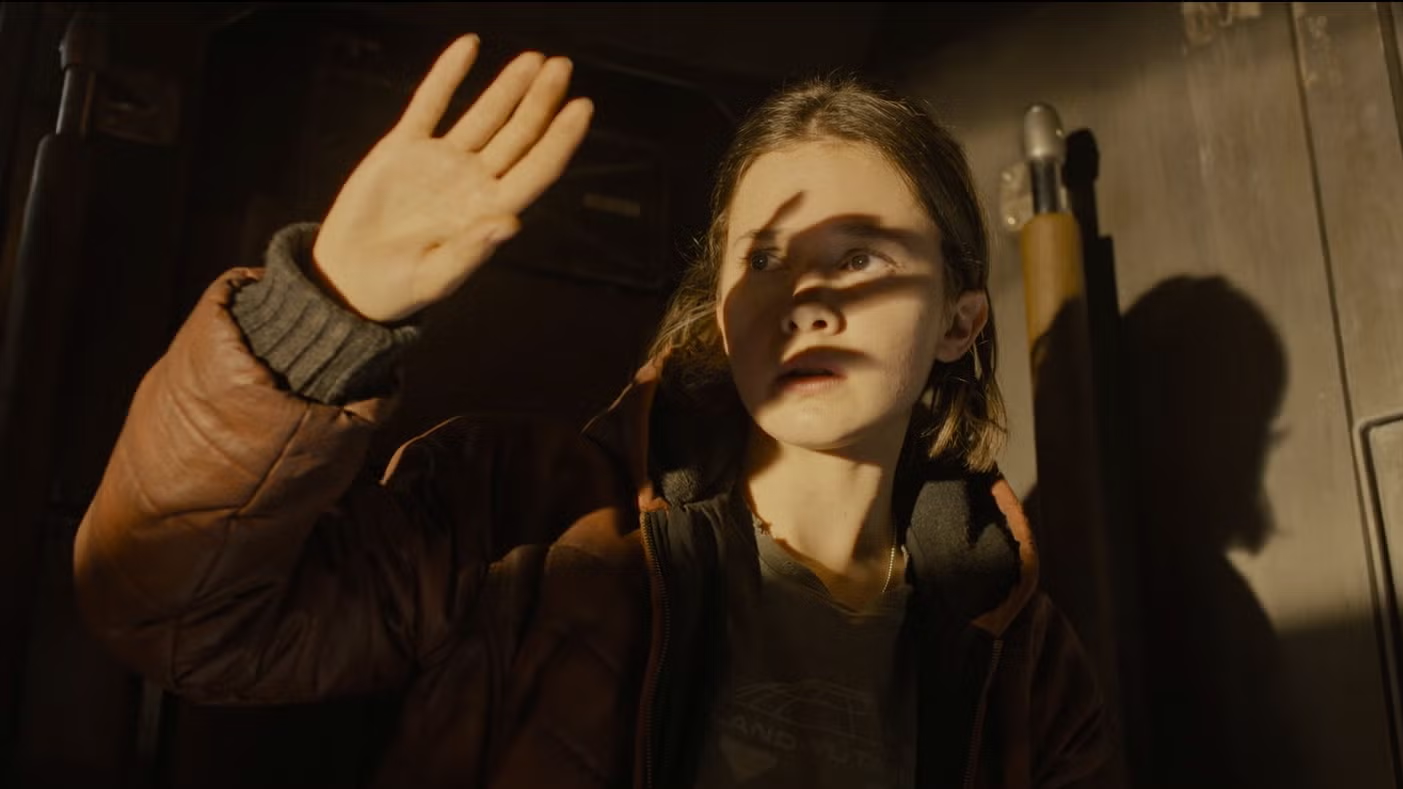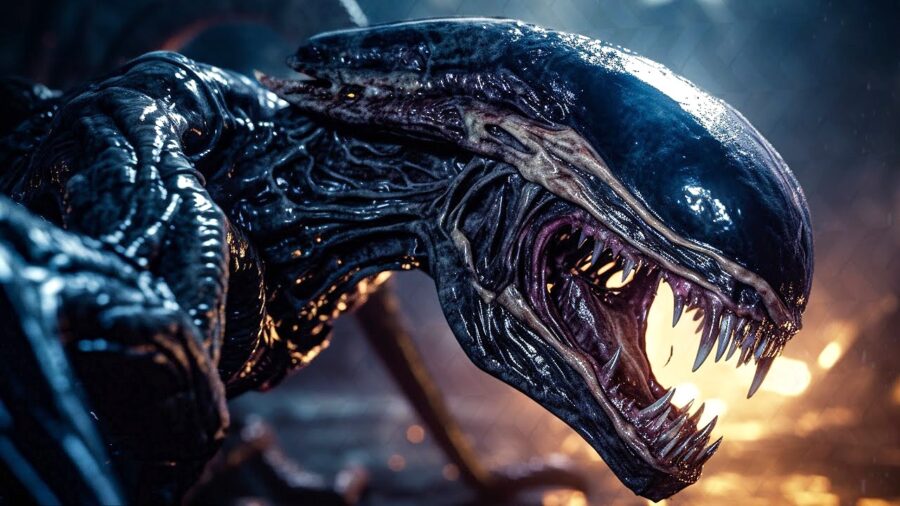The ending of Alien: Romulus introduces a pivotal question about the fate of the newly created Xenomorph hybrid. While the creature is thrown into space by Rain, it’s not certain that it meets its end. After all, the Xenomorph from the first film survived the same fate, which suggests this hybrid might too. Xenomorphs are known for their resilience, capable of surviving harsh environments, including the vacuum of space. It’s possible that this new offspring could return in a future sequel, potentially even evolving in ways that make it more adaptable to space.
Alien Romulus Ending Explained: Rook’s Prime Directive & Prometheus Connection in Alien: Romulus
Rook, a synthetic science officer aboard the Renaissance ship, plays a crucial role in advancing the plot with his prime directive. His mission is to retrieve the Xenomorph and use it to develop the Prometheus 5 formula, which is designed to enhance human evolution and immunity. This directive mirrors the broader goals of the Weyland-Yutani corporation, which sees the preservation of humanity as secondary to advancing its own objectives. Rook’s adherence to this directive, even at the cost of human lives, underlines the cold, corporate-driven priorities of the film.
The Prometheus 5 formula was inadvertently injected into Kay, resulting in the creation of a Xenomorph-human hybrid. This tie to the Prometheus films emphasizes the continuing influence of the black goo and its capacity to mutate and create new life. This formula, although initially aimed at advancing human evolution, also leads to chaos, with deadly consequences for those involved.

Rain & Andy’s Relationship in Alien: Romulus Is Unique to the Franchise
The dynamic between Rain and Andy is notably different from other human-synthetic relationships depicted in the Alien franchise. As a synthetic, Andy was designed to care for Rain, especially after the loss of her parents. However, their bond transcends that of a mere caretaker and charge. Rain treats Andy as family, demonstrating a sense of care and affection that goes beyond programming. This unique relationship is central to the narrative, offering a refreshing twist compared to other synthetic-human interactions in the series, where synthetics often operate with impersonal, directive-driven motives.
Their bond also contrasts with the relationships of other characters, such as Rook, who views humans as expendable for the greater goal of advancing the species. Unlike Rook, who prioritizes corporate directives, Rain and Andy’s relationship highlights the theme of love and loyalty, making their connection one of the more emotionally complex aspects of the film. Their relationship forms the emotional core of Alien: Romulus, making it stand out from other stories in the franchise.
How Alien: Romulus’ Ending Sets Up Another Alien Sequel
The ending of Alien: Romulus leaves room for further exploration, particularly regarding the fate of Rain and Andy. With both characters in cryosleep, heading toward the Yvaga system, their journey is far from over. The film hints at potential challenges awaiting them, especially since the colony on Yvaga is hostile to synthetics. This sets the stage for a potential sequel that could explore their arrival and the conflict they may encounter, both with the colony and possibly other forces, like Weyland-Yutani.
Rain’s promise to “fix” Andy also provides a compelling narrative hook. While they are currently in cryosleep, it’s clear that their story is far from concluded. The unresolved nature of their fates, combined with the ongoing danger posed by the Xenomorph hybrid, offers plenty of room for future installments in the Alien franchise. The unresolved questions of their survival and what lies ahead on Yvaga leave audiences eager for more.

Everyone Who Died in Alien: Romulus (In Order)
Several characters meet their grim fate in Alien: Romulus, underscoring the perilous nature of their mission. Navarro is killed by a chestburster from the Scorched Xenomorph. Bjorn suffers a tragic end when he’s melted by acidic blood. Tyler is violently killed when a Xenomorph crushes his skull, and Kay meets her demise as the offspring hybrid devours her. Finally, Rook is destroyed during a catastrophic collision between the Renaissance station and an asteroid belt. The high mortality rate among the characters serves as a reminder of the ever-present danger of the Xenomorphs.
These deaths also emphasize the central theme of survival in a hostile environment. The characters are constantly at the mercy of the Xenomorphs, with few managing to escape their deadly grasp. The rapid turnover of characters highlights the unpredictable and dangerous world of Alien: Romulus.
The Real Meaning of Alien: Romulus’ Ending
At its core, Alien: Romulus is a commentary on the manipulation of humanity by powerful corporations. While Xenomorphs are often portrayed as the ultimate predatory species, the film suggests that humanity still has the potential to fight back. The ending underscores the theme of choosing humanity over cold, corporate objectives. Rook’s blind obedience to Weyland-Yutani’s directives leads him to sacrifice human lives for the sake of advancing a dangerous experiment. However, the film’s resolution shows that Rain, by prioritizing love and connection over directives, ultimately makes a more humane choice.
The ending also touches on the exploitation of human lives by corporations, exemplified by Weyland-Yutani’s use of Andy to further their own goals. The characters in Alien: Romulus are often caught between the demands of the corporation and their desire to live better lives. Rain’s decision to protect Andy and value their bond over the prime directive challenges the dehumanizing nature of corporate control and serves as a reminder of the importance of choosing personal connections over faceless corporate agendas.

How The Alien Romulus Ending Was Received
Alien: Romulus received praise for its return to the roots of the Alien franchise. Critics and audiences alike lauded the film for blending elements from the first two Alien films while introducing new ideas. On Rotten Tomatoes, the film received an 80% approval rating from critics and an 85% score from audiences. The film was praised for its refreshing take on the series, with one reviewer stating that it successfully keeps the franchise alive while offering something new.
Peter Travers of ABC News acknowledged that Alien: Romulus “shamelessly feeds off the DNA” of the earlier films, but he praised its ending for bringing the terror to a new level. The last third of the film, in particular, was noted for ramping up the horror and delivering a tense, memorable conclusion. This positive reception is reflected in fan reactions as well, with Reddit users discussing how the ending, particularly the appearance of the Xenomorph offspring, left them genuinely unnerved.
Fans also took to social media to analyze the film’s use of the black goo and its role in creating the hybrid. Some users saw the goo as a way of providing answers to lingering questions from Prometheus and Covenant, particularly concerning its effect on human DNA. The way the goo behaves in Alien: Romulus seems to offer more clarity on its properties and the way it mutates life. This deeper exploration of the black goo has sparked discussions among fans, further solidifying the film’s place in the Alien canon.





